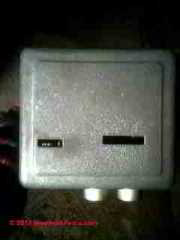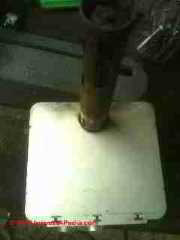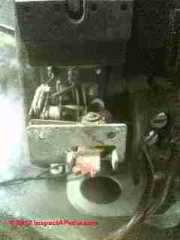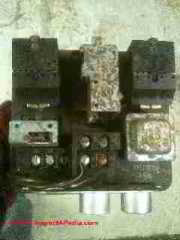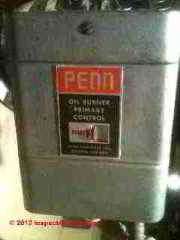 Penn Stack Relay Switches on Oil Fired Heating Equipment
Penn Stack Relay Switches on Oil Fired Heating Equipment
Penn oil burner primary control operation, adjustment, repair
- POST a QUESTION or COMMENT about oil heating equipment stack relay installation, diagnosis, repair, re-set procedure & replacement options
Penn oil burner primary control: stack relay switch guide for oil fired heating equipment:
This article answers questions about the Penn oil burner stack relay control.
In this article series we explain how to inspect, test, reset, or clean the stack relay switch used as a flame detection/safety device for primary control on oil fired heating systems (boilers and furnaces).
InspectAPedia tolerates no conflicts of interest. We have no relationship with advertisers, products, or services discussed at this website.
- Daniel Friedman, Publisher/Editor/Author - See WHO ARE WE?
A Guide to Penn Oil Burner Stack Relay Control Switches on Boilers, Furnaces, or Water Heaters
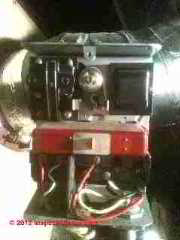
Reader Question: Penn Oil Burner Primary Control (Stack Relay Switch) operation: how long should it take for the stack relay to turn off the oil burner?
I have two really old used stack relays that I'm tinkering with to learn about them and want to know the seconds at when they are set to trip at usually?
One of mine trips at 100 seconds and I have not tested the other but was wondering if that is not the right time or too long or if there is a way to lower that number so it trip at less seconds or is it fried past fixing cause I love to fix or rebuild and tinker with oil burner stuff??
At left is the Penn oil burner primary control stack relay. The one that is working in my workshop
Thanks Ben. Please reply.
- Ben Bourdreau, Maine
Here [photos above] is the interior of the Penn Oil Burner primary control stack relay - looking nice and clean.
Reply:
Ben:
Typically safety switches cut off the burner at a "nominal" delay of 75 seconds (RA 116A and RA 117A Protectorelays) according to Honeywell[3]. 100 is a bit long but probably within tolerance in my opinion. Keep in mind that these are not lab grade instruments.
It is also my OPINION that in comparison with a cad cell relay switch, a stack relay type switch may have to let the oil burner run a bit longer before deciding to shut the system down.
That's because the cad cell is right in the combustion chamber where it can "see" the flame (or not), while a stack relay is located in the flue vent connector - a location at which more time might be needed for the flue gases to reach a sufficient temperature to keep the switch closed (that is, to avoid turning off the burner).
The issue is the longer the oil burner gun assembly shoots unburned oil into the combustion chamber the greater the risk of a puffback when ignition finally occurs.
Exactly how long the stack relay takes to respond to the temperature in the flue vent connector depends on some variables besides the instrument itself including
- Proper stack relay installation -
that does not interfere with movement of the bimetallic spring and that does not, by contact with the equipment, conduct heat away from the sensor. Incidentally the device is capable of handling temperatures up to 1000F. - Proper stack relay installation location
not somewhere distant from the heater - Proper primary control maintenance
a soot-coated stack relay is insulated from heat so will take longer to respond to temperature - possibly cutting off the system when it should not - The condition of the relays inside the switch
and whether or not they have been "re-stepped" properly. You can see the re-step lever in our illustration in the Protectorelay article above. - The condition of any moving parts inside the switch
that may have been bent or corroded due to abuse or poor environmental conditions.
When I worked on heating systems I found these switches reliable and very durable, and I note that at these Stack relays or Honeywell Protectorelay® devices have been in use for a very long time[2] and are still produced and installed and in use on some heating equipment.[3]
Shown below is the outside of the Honeywell The small slot is the slide reset lever and the large one must have been where the Honeywell tag wa
The thing looks so new because I replaced some parts like the cover and wiring knockouts and the back of it from a bad relay but good parts ( is it always workout that way)
Watch out: while we applaud your interest in understanding and restoring antique oil burner controls such as the Penn Oil Burner Primary Control or the Honeywell Stack Relay, just cleaning up contacts and removing rust may not assure that the device will work properly and safely.
In particular, a bent, modified, corroded, or obstructed helix, that bimetallic spring that responds to temperature and operates the control may appear to work but may not respond properly at the proper temperature range.
Modern versions of these Protectorelay® switches are the #RA117A1047/U (three wire control)[5] and the #RA116A1055 (stack relay)[6].
For a wiring schematic and installation instructions you can contact Honeywell Corporation at the location listed in our references below.
Reader Follow-Up:
Shown below are photos of the front and rear of the Honeywell Stack Relay primary control.
If I ever get time or when I can I will send info I know or have learned about stuff I tinker with!! I'm only 22 so I got life ahead of me, Thanks again for replying and Thanks so much for one of the best web pages I have ever come across about the stuff I like!!! I am always on your page looking at stuff.
Also I heard back from a guy I know that knows about heating stuff and he said honeywell use to make a 90 sec stack relay in the 60's and stopped making them but some are still in use today!!
Feel free to use what I said if you would like about the stack relay!! You can also use my name thanks again Ben BOUDREAU
P. s. I will send you a photo of the working stack relay but not installed yet and I also have a picture of a working and installed one made by PENN controls in one of my work shops on the furnace. - Ben
Below left Mr. Bourdreau's photo shows the (corroded) stepping relay inside the Honeywell primary control stack relay.
At below right Bourdreau illustrates the reset lever for the stack relay. The notched red lever protrudes through the control cover when the cover has been replaced on the unit. The stepping relay (below left) is accessible only by removing the cover.
The corrosion on these parts would lead a heating service tech to trash this control as unreliable and possibly unsafe. - Ed.
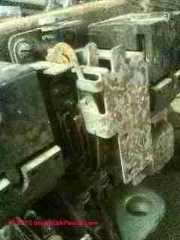
Mr. Bourdreau's photos show the interior of the Honeywell stack relay looking down on the controls, relays, and wiring terminals.
Watch out: we see severe surface corrosion inside this primary control - there is high risk that this is an unreliable heating system control unit.
The articles at this website describe the basic components of a home heating system, how to find the rated heating capacity of an heating system by examining various data tags and components, how to recognize common heating system operating or safety defects, and how to save money on home heating costs.
We include product safety recall and other heating system hazards.
Also see GAS PIPING, VALVES, CONTROLS for more details on how to inspect and test LP and natural gas piping, controls, valves, and tanks.
Contact us to suggest text changes and additions and, if you wish, to receive online listing and credit for that contribution.
...
Continue reading at STACK RELAY SWITCH - topic home, or select a topic from the closely-related articles below, or see the complete ARTICLE INDEX.
Or see these
Recommended Articles
- ELECTRIC MOTOR OVERLOAD RESET SWITCH
- FIRE SAFETY CONTROLS - home
- FURNACE CONTROLS & SWITCHES
- HEAT WON'T TURN OFF
- HEAT WON'T TURN ON
- OIL BURNER INSPECTION & REPAIR
- STACK RELAY SWITCH - home
- DEFNITION of STACK RELAY SWITCH - PROTECTORELAY
- STACK RELAY MOUNTING POSITION
- STACK RELAY OPERATION
- STACK RELAY RESET BUTTON OPERATION
- STACK RELAY INTERNAL RE-STEPPING the CONTACTS
- STACK RELAY MANUALS
- STACK RELAY SERVICE & TEST PROCEDURES - separate article
- STACK RELAY, WHEN to CLEAN
- STACK RELAY DELAY TIME ADJUSTMENT
- STACK RELAY REPLACEMENT CROSS REFERENCE CHART - separate article
- PENN OIL BURNER STACK RELAY OPERATING DETAILS - separate article
- STEAM HEATING SYSTEMS & CONTROLS
Suggested citation for this web page
PENN OIL BURNER STACK RELAY OPERATING DETAILS at InspectApedia.com - online encyclopedia of building & environmental inspection, testing, diagnosis, repair, & problem prevention advice.
Or see this
INDEX to RELATED ARTICLES: ARTICLE INDEX to HEATING OIL, OIL BURNERS, OIL FIRED HEATERS, OIL TANKS
Or use the SEARCH BOX found below to Ask a Question or Search InspectApedia
Or see
INDEX to RELATED ARTICLES: ARTICLE INDEX to HEATING SYSTEMS
Or use the SEARCH BOX found below to Ask a Question or Search InspectApedia
Ask a Question or Search InspectApedia
Try the search box just below, or if you prefer, post a question or comment in the Comments box below and we will respond promptly.
Search the InspectApedia website
Note: appearance of your Comment below may be delayed: if your comment contains an image, photograph, web link, or text that looks to the software as if it might be a web link, your posting will appear after it has been approved by a moderator. Apologies for the delay.
Only one image can be added per comment but you can post as many comments, and therefore images, as you like.
You will not receive a notification when a response to your question has been posted.
Please bookmark this page to make it easy for you to check back for our response.
IF above you see "Comment Form is loading comments..." then COMMENT BOX - countable.ca / bawkbox.com IS NOT WORKING.
In any case you are welcome to send an email directly to us at InspectApedia.com at editor@inspectApedia.com
We'll reply to you directly. Please help us help you by noting, in your email, the URL of the InspectApedia page where you wanted to comment.
Citations & References
In addition to any citations in the article above, a full list is available on request.
- [2]AUDELS OIL BURNER GUIDE, INSTALLING, SERVICING, REPAIRING, [PDF online copy of this book] Frank D. Graham, Theo. Audel & Co., New York 1946, 1947, 1955 (out of print, copies occasionally available from antique book dealers and on EBay). Use THIS LINK to read a free online copy of this helpful classic textbook.. Originally this 364 page guide to oil burner installation, operation, diagnosis, and repair sold for $1.00 - one dollar.
- [3] RA116A and RA117A Protectorelay®, Oil Burner Controls, Honeywell, 1985 Douglas Drive North, Golden Valley MN 55422-3992, Tel: 800-3456770 x 423, Website: customer.honeywell.com or in Canada: Honeywell Limited, 35 Dynamic Dr., Toronto, Ontario M1V 4Z9, website: www.honeywell.com, June 2000. Web search 4/3/2012, original source: http://customer.honeywell.com/techlit/pdf/63-0000s/63-9421.pdf
- [4] Domestic and Commercial Oil Burners, Charles H. Burkhardt, McGraw Hill Book Company, New York 3rd Ed 1969.
- [5] Honeywell Protector Relay Controller 3-Wire # RA117A1047, Installation Instructions from Honeywell
- [6] Honeywell Protectorelay Controller (Stack Switch) # RA116A1055, Installation Instructions from Honeywell
- The Steam Book, 1984, Training and Education Department, Fluid Handling Division, ITT [probably out of print, possibly available from several home inspection supply companies] Fuel Oil and Oil Heat Magazine, October 1990, offers an update,
- Principles of Steam Heating, $13.25 includes postage. Fuel oil & Oil Heat Magazine, 389 Passaic Ave., Fairfield, NJ 07004.
- The Lost Art of Steam Heating, Dan Holohan, 516-579-3046 FAX
- Principles of Steam Heating, Dan Holohan, technical editor of Fuel Oil and Oil Heat magazine, 389 Passaic Ave., Fairfield, NJ 07004 ($12.+1.25 postage/handling).
- "Residential Steam Heating Systems", Instructional Technologies Institute, Inc., 145 "D" Grassy Plain St., Bethel, CT 06801 800/227-1663 [home inspection training material] 1987
- "Residential Hydronic (circulating hot water) Heating Systems", Instructional Technologies Institute, Inc., 145 "D" Grassy Plain St., Bethel, CT 06801 800/227-1663 [home inspection training material] 1987
- "Warm Air Heating Systems". Instructional Technologies Institute, Inc., 145 "D" Grassy Plain St., Bethel, CT 06801 800/227-1663 [home inspection training material] 1987
- Heating, Ventilating, and Air Conditioning Volume I, Heating Fundamentals,
- Boilers, Boiler Conversions, James E. Brumbaugh, ISBN 0-672-23389-4 (v. 1) Volume II, Oil, Gas, and Coal Burners, Controls, Ducts, Piping, Valves, James E. Brumbaugh, ISBN 0-672-23390-7 (v. 2) Volume III, Radiant Heating, Water Heaters, Ventilation, Air Conditioning, Heat Pumps, Air Cleaners, James E. Brumbaugh, ISBN 0-672-23383-5 (v. 3) or ISBN 0-672-23380-0 (set) Special Sales Director, Macmillan Publishing Co., 866 Third Ave., New York, NY 10022. Macmillan Publishing Co., NY
- Installation Guide for Residential Hydronic Heating Systems
- Installation Guide #200, The Hydronics Institute, 35 Russo Place, Berkeley Heights, NJ 07922
- The ABC's of Retention Head Oil Burners, National Association of Oil Heat Service Managers, TM 115, National Old Timers' Association of the Energy Industry, PO Box 168, Mineola, NY 11501. (Excellent tips on spotting problems on oil-fired heating equipment. Booklet.)
- Our recommended books about building & mechanical systems design, inspection, problem diagnosis, and repair, and about indoor environment and IAQ testing, diagnosis, and cleanup are at the InspectAPedia Bookstore. Also see our Book Reviews - InspectAPedia.
- In addition to citations & references found in this article, see the research citations given at the end of the related articles found at our suggested
CONTINUE READING or RECOMMENDED ARTICLES.
- Carson, Dunlop & Associates Ltd., 120 Carlton Street Suite 407, Toronto ON M5A 4K2. Tel: (416) 964-9415 1-800-268-7070 Email: info@carsondunlop.com. Alan Carson is a past president of ASHI, the American Society of Home Inspectors.
Thanks to Alan Carson and Bob Dunlop, for permission for InspectAPedia to use text excerpts from The HOME REFERENCE BOOK - the Encyclopedia of Homes and to use illustrations from The ILLUSTRATED HOME .
Carson Dunlop Associates provides extensive home inspection education and report writing material. In gratitude we provide links to tsome Carson Dunlop Associates products and services.


